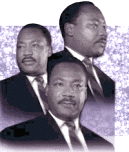The Origin of Martin Luther King, Jr. Day (January)
The bill was finally passed by both the House of Representatives and the Senate and was signed into law on November 2, 1983. The first national celebration of the Dr. Martin Luther King, Jr. holiday took place January 20, 1986. http://www.holidays.net/mlk/holiday.htm
It is the first new holiday since 1948, when Memorial Day was created as a "prayer for peace" day. And it's only the third this century (the other is Veterans Day, created as Armistice Day in 1926 to honor those who died in World War I). King is the only American besides George Washington to have a national holiday designated for his birthday (those of Abraham Lincoln, Thomas Jefferson, Robert E. Lee and others have been celebrated in some states but not nationwide). SOURCE: http://martin-luther-king-day.123holiday.net/king_creation.html A compromise moving the holiday from Jan. 15, King's birthday, which was considered too close to Christmas and New Year's, to the third Monday in January helped overcome opposition to the law. SOURCE: http://www.infoplease.com/spot/mlkhistory1.html
|
|
The Origin of Black History Month (February) CARTER G. WOODSON (1875-1950) was born to parents who had been slaves. Neither his Mother nor Father could read or write. Mr. Woodson had to work to earn money for the family and did not start school until later than most children. But, his motto was it is "never to late to learn." He became a high school teacher; and was sad to discover that none of the schools taught the history of Black Americans. He started the Association for the Study of Negro Life and History to study the important things Black people had accomplished and on February 19, 1926 Woodson established "Negro History Week". SOURCE: http://www.euronet.nl/users/jubo/february.html February marks the
beginning of Black History Month - an annual celebration that has
existed since 1926. But what are the origins of Black History Month?
SOURCE: http://www.historychannel.com/blackhistory/ Black History Month sparks an annual debate about the continued usefulness of a designated month dedicated to the history of one race. In the December 18, 2005 episode of 60 Minutes, Morgan Freeman criticized Black History Month. "I don't want a black history month. Black history is American history." Freeman believes that racism will persist as long as individuals continue to identify themselves by their race. Dr. Woodson, creator of Negro History Week, hoped that the week would eventually be eliminated, when African-American history would be fully integrated with American history. SOURCE: http://en.wikipedia.org/wiki/Black_History_Month
|
|
The Origin of Juneteenth (June) On June 19, 1865, the
Union General Gordon Granger rode into Galveston, Tex., to inform
inhabitants of the Civil War’s end two months earlier. Two and a
half years after Abraham Lincoln signed the Emancipation
Proclamation, Granger’s General Order Number 3 finally freed the
last 250,000 slaves whose bondage, due to the minimal Union presence
in the region, had been essentially unaffected by SOURCE: http://www.infoplease.com/spot/juneteenth1.html
|
|
The Origin of Kwanzaa (December) The year 2005 will
see the 40th annual Kwanzaa, the African American holiday celebrated
from December 26 to January 1. It is estimated that some 18 million
African Americans take part in Kwanzaa. The principles of Kwanzaa form the answers.
Kwanzaa is celebrated with red, black, and green. These three colors were important symbols in ancient Africa that gained new recognition through the efforts of Marcus Garvey's Black Nationalist movement. Green is for the fertile land of Africa; black is for the color of the people; and red is the for the blood that is shed in the struggle for freedom. SOURCE: http://www.infoplease.com/spot/kwanzaa1.html
|
 Each
year on the third Monday of January, schools, federal offices, post
office and banks across America close as we celebrate the newest
American national holiday. 15 years after Dr. King's death President
Ronald Reagan signed a bill into law making the third Monday of
January a national holiday celebrating the birth and life of Dr.
Martin Luther King, Jr.
Each
year on the third Monday of January, schools, federal offices, post
office and banks across America close as we celebrate the newest
American national holiday. 15 years after Dr. King's death President
Ronald Reagan signed a bill into law making the third Monday of
January a national holiday celebrating the birth and life of Dr.
Martin Luther King, Jr.  The King Day of
Service is a way to transform Dr. Martin Luther King, Jr.’s life and
teachings into community service that helps solve social problems.
That service may meet a tangible need, such as fixing up a school or
senior center, or it may meet a need of the spirit, such as building
a sense of community or mutual responsibility. Americans across the
country will celebrate by honoring the life and work of Dr. Martin
Luther King, Jr. Hundreds of thousands of Americans will remember
and memorialize Dr. King by participating in service projects in
their communities. Together, they will honor King’s legacy of
tolerance, peace, and equality by meeting community needs and making
the holiday “A day ON, not a day OFF.”
The King Day of
Service is a way to transform Dr. Martin Luther King, Jr.’s life and
teachings into community service that helps solve social problems.
That service may meet a tangible need, such as fixing up a school or
senior center, or it may meet a need of the spirit, such as building
a sense of community or mutual responsibility. Americans across the
country will celebrate by honoring the life and work of Dr. Martin
Luther King, Jr. Hundreds of thousands of Americans will remember
and memorialize Dr. King by participating in service projects in
their communities. Together, they will honor King’s legacy of
tolerance, peace, and equality by meeting community needs and making
the holiday “A day ON, not a day OFF.”